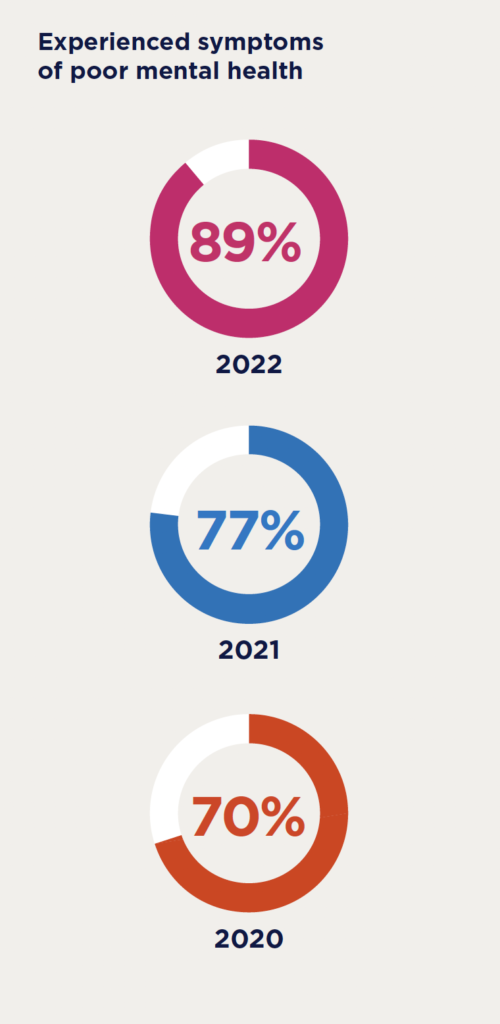How mental health is fueling a global ‘boss loss’
More than half of executives in the UAE questioned in a new survey want to quit their jobs over their mental health, as HNWI and C-Suite stress levels soar around the world.
The findings were captured in the latest chapter of the Bupa Global Executive Wellbeing Index took a global view, using insights across markets from the United Kingdom, United States, China, France, United Arab Emirates, Egypt, Singapore and Hong Kong.
The research looks at the bigger picture, through the eyes of high net-worth individuals (HNWIs) who make financial and business decisions that affect the lives of millions of people around the world.
The highest levels of mental distress were reported in Singapore – 99 percent – the US – 97 percent – with the UAE third in the world with 96 percent. They were moderately lower in Hong Kong (76 percent), China (88 percent) and the UK (92 percent).
UAE findings
More than half of UAE’s top-level executives – 53 percent plan a major career change in the next year
Maintaining mental health and time with family and friends is a key motivator for UAE top leaders to alter their career choice
At 94 percent of top management experienced symptoms of poor mental health this year, with 20 percent reaching burnout – yet few have sought professional help.
Dean Pollard, General Manager, Bupa Global Middle East and Asia said: “Despite UAE top executives recognising the need to prioritise mental health of their people by investing in wellbeing, they are not prioritising their own needs.
“There is still much work to be done to alleviate the stigma around mental health and reluctance to ask for help amongst senior leaders, which has led to many suffering from burn-out, anxiety and low mood.
“We believe a shift is in motion with a collective rethinking of priorities that will hopefully lead to healthier, happier senior management – essential for the success of any organisation.”

Carlos Jaureguizar, CEO, Bupa Global and UK, said: “The leaders we spoke to highlighted economic uncertainty, the continued impact of the pandemic, and challenges around recruitment, retention and staff welfare as top of mind.
“All of which have contributed to high levels of stress, anxiety and burnout. However, the Index also reveals that whilst leaders’ mental and physical health are reaching breaking point, very few have sought formal support.
“Often, they’ve put their health and wellbeing on the backburner as they manage these pressures, making difficult decisions which often stay with them outside of work.
“So it might not seem that surprising that for the first time, global business leaders are planning fundamental changes to the way they work; whether this is going part time, changing their careers, moving to consulting roles, or even resigning in order to reduce their stress and improve their mental wellbeing.
“Whilst the ‘Great Resignation’ played out in 2022, in 2023 we could potentially see seismic shifts in the labour market at the highest level, during a time of huge economic uncertainty, affecting the future pipeline of leadership.”
The findings map closer to the wider Cigna 360 Wellbeing Survey which earlier this year found that 98 percent of UAE respondents were reporting at least one symptom of burnout, with total and unmanageable stress leading the world.
In the same research 55 percent of respondents this year in the UAE said they were going to quit their jobs to seek a better work life balance, underlying the mobility that talent in the Emirates can access. Indeed the UAE led the world in that desire to reprioritize, especially given metrics outside of the world of work, such as family, physical health, social and general wellbeing, also rising above global norms.

Speaking of what Bupa branded ‘the Boss Loss’, Anthony Cabrelli, Managing Director for Bupa Global said: “Like everyone during these challenging times, senior
leaders are under immense pressure and are weighing up if their ways of working are sustainable for their long-term mental health.
“This has been exacerbated further by recent global events, increasing pressure on leaders to navigate an unpredictable economic landscape to meet their business targets, whilst also feeling greater responsibility to provide stability for their workforce. To meet this challenge, organisations will need to be attuned to the differing needs and expectations in the different parts of their business.
“It’s no longer enough to offer a good renumeration package. Everyone is looking for more — whether that’s a better work life balance, more attractive health and welfare policies and benefits, a more robust commitment to environmental, social and governance issues, or a combination of these.”